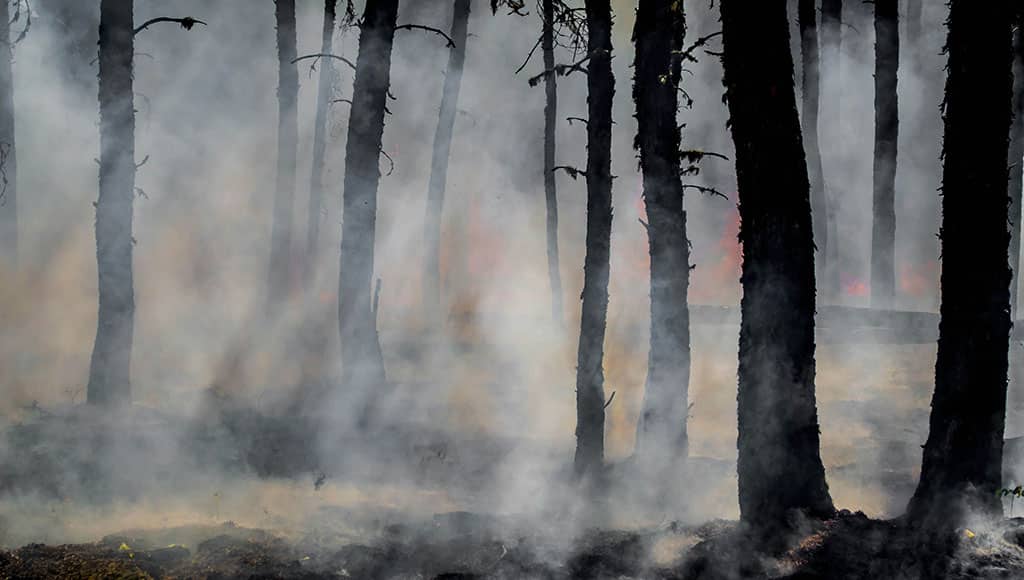In trying to suppress wildfires, the main focus for firefighters is the preservation of life and property, through preventing the fire reaching those who could be potentially affected. The risk to properties can be mitigated by owners themselves through fuel management (land cleaning), understanding the risks and being prepared.
The effects of climate change
The extreme wildfire risk is growing, as demonstrated by the unprecedented frequency and severity of wildfires that have occurred in recent years in many regions of the world, including here in Portugal. Wildfires threaten communities and ecosystems and cause significant economic disruption.
Climate change has been identified as one of the key drivers behind these extremes. By affecting temperature, precipitation and wind patterns, as well as the likelihood of extreme weather events, climate change influences wildfire occurrence, spread and intensity by altering fire weather conditions, the amount and conditions of vegetation available to burn, as well as the likelihood of ignition. An example of this were the heatwaves in Portugal in 2022, which facilitated the increased intensity, spread and duration of fires.
Climate change threatens to increase the frequency, extent, and severity of wildfires in some regions by raising the average temperature, intensifying droughts, prolonging the dry season and reducing soil moisture. Globally, more than 90% of fires are caused by humans, either deliberately, or accidentally. When human-induced fire starts, the warmer and drier conditions driven by climate change help to spread them leading to larger, more deadly fires that are difficult to control.
Wildfires have the potential to harm property, livelihoods, and emit large amounts of pollutants impacting human health. Wildfires also cause death and injury directly, may disrupt access to health services, and large numbers of people are displaced for months. Mental health impacts are common in the aftermath of wildfires. It is crucial to understand how wildfire risk may change in a future warmer climate to guide plans for adaptation and reduce disaster risk.
To summarize, the feedback between climate change and wildfires is as follows: 1. Climate change increases wildfire frequency and intensity; 2. Extreme wildfire events increase greenhouse gas emissions; and 3. Greenhouse gas emissions from wildfires fuel climate change.
Health impact from wildfires
However, there is another aspect and that is the health risks posed from wildfires, primarily from smoke contributing to unhealthy air quality.
As we saw from the fires in São Marcos da Serra, Algarve, in July 2022, smoke driven by the strong winds travelled many kilometres eastwards, reaching as far as Moncarapacho, Loulé and Olhos de Água. This naturally caused concern, not only as it affected air quality but because many people were worried that the fire itself was spreading to their areas, which was not the case.
Smoke respects no boundaries, not even national boundaries; an example being in May 2023 where smoke from fires in Canada, which was experiencing an extremely severe fire season, not only blanketed the skies over North America but has also reached as far as Europe, including Portugal.
The severity of health risks from wildfires can vary depending on factors such as the size and intensity of the wildfire, proximity to the fire, underlying health conditions, effectiveness of emergency response, and access to healthcare.
Increase in respiratory and cardiovascular diseases
Wildfires produce vast amounts of smoke contributing to unhealthy air quality. The smoke, which contains fine particulate matter (PM2.5), can travel deep into the lungs causing respiratory problems or exacerbating pre-existing respiratory and cardiovascular illnesses.
A study conducted by the ACRoBEAR project in Sweden (Jämtland and Härjedalen) in 2018 found that wildfires with short periods of poor air quality increased the risk of respiratory morbidity and an increased burden on number of patients at hospitals and healthcare centres.
In Europe, between 1990-2019, mortality from ambient air pollution PM2.5 declined by 10,000 deaths per year. However, mortality from wildfire smoke increased substantially by more than 100% in the same period. Eastern European countries had significantly higher impacts on mortality from wildfire smoke compared to their Western and Central European counterparts.
Wildfire pollution is an important and increasing impact of climate change on human health that affects populations globally. Pollutants contribute to respiratory, cardiovascular, and pregnancy-related health effects, increasing premature deaths. Wildfire pollution is increasing globally, making it more difficult for countries to reach their National Air Quality Standards.
Wildfire smoke can be much more toxic to human health as compared to air pollutants from other sources such as industry or power generation. In the last two decades, exposure to wildfire particulate matter (PM2.5) increased by 60% globally, and by 40% over Europe. As mentioned earlier, smoke from wildfires can be transported over long distances. Large fires in remote regions such as the Arctic can have substantial health impacts in neighbouring, more densely populated areas.
Action to take if affected by smoke
The Director General of Health has issued a health warning with recommended protection measures, regarding inhaling smoke from the fires in central and north of the country.
It is important that people stay alert and avoid exposure to smoke and ideally stay at home in a cool area of the house, with windows and doors closed so that smoke does not enter the house; adding a cool environment, and, if possible, turn on the air conditioner to circulate the air. Avoid outdoor activities, avoid the use of indoor combustion sources (gas appliances or firewood, tobacco, candles, incense, etc.) and use mask/respirator (N95) whenever exposure is unavoidable, are other measures.
The way forward
Prioritise the development and implementation of comprehensive wildfire management strategies that focus on prevention, early detection, and rapid response. Strengthen capacity for monitoring and assessing the health impacts of wildfires e.g., establishing surveillance systems to track respiratory illnesses and other health conditions related to wildfire smoke exposure.
Sources: Prevention Web, OECD, DGS
By David Thomas
|| features@algarveresident.com
David Thomas is a former Assistant Commissioner of the Hong Kong Police, consultant to INTERPOL and the United Nations Office on Drugs and Crime.
In 2011, he founded Safe Communities Algarve to help the authorities and the community prevent crime. It is now registered as Associação SCP Safe Communities Portugal, the first national association of its type in Portugal.
913 045 093
info@safecommunitiesalgarve.com
www.safecommunitiesportugal.com















